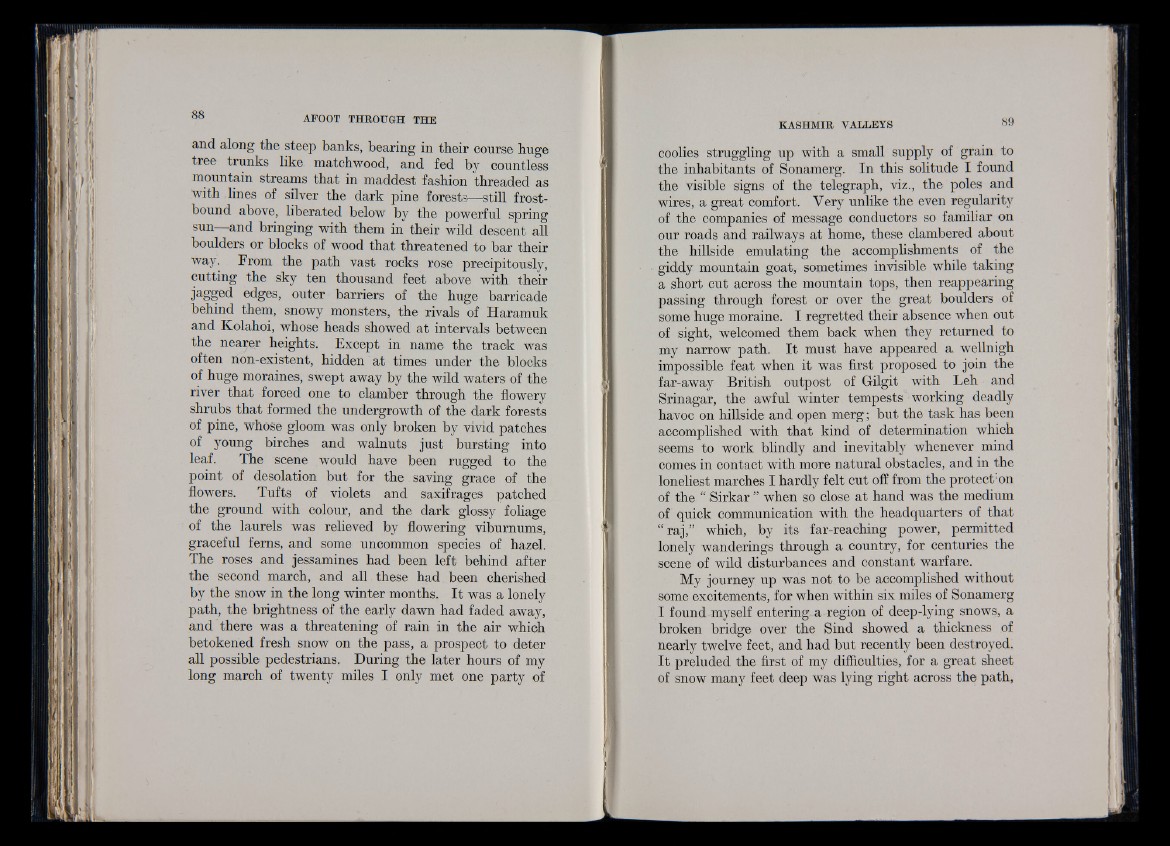
and along the steep banks, bearing in their course huge
tree trunks like matchwood, and fed by countless
mountain streams that in maddest fashion threaded as
with lines of silver the dark pine forests.—still frost-
bound above, liberated below by the powerful spring
sun—-and bringing with them in their wild descent all
boulders or blocks of wood that threatened to bar their
way. Erom the path vast rocks rose precipitously,
cutting the sky ten thousand feet above with their
jagged edges, outer barriers of the huge barricade
behind them, snowy monsters, the rivals of Haramuk
and Kolahoi, whose heads showed at intervals between
the nearer heights. Except in name the track was
often non-existent, hidden at times under the blocks
of huge moraines, swept away by the wild waters of the
river that forced one to clamber through the flowery
shrubs that formed the undergrowth of the dark forests
of pine, whose gloom was only broken by vivid patches
of young birches and walnuts just bursting into
leaf. The scene would have been rugged to the
point of desolation but for the saving grace of the
flowers. Tufts of violets and saxifrages patched
the ground with colour, and the dark glossy foliage
of the laurels was relieved by flowering viburnums,
graceful ferns, and some uncommon species of hazel.
The roses and jessamines had been left behind after
the second march, and all these had been cherished
by the snow in the long winter months. I t was a lonely
path, the brightness of the early dawn had faded away,
and there was a threatening of rain in the air which
betokened fresh snow on the pass, a prospect to deter
all possible pedestrians. During the later hours of my
long march of twenty miles I only met one party of
coolies struggling up with a small supply of grain to
the inhabitants of Sonamerg. In this solitude I found
the visible signs of the telegraph, viz., the poles and
wires, a great comfort. Very unlike the even regularity
of the companies of message conductors so familiar on
our roads and railways at home, these clambered about
the hillside emulating the accomplishments of the
giddy mountain goat, sometimes invisible while taking
a short cut across the mountain tops, then reappearing
passing through forest or over the great boulders of
some huge moraine. I regretted their absence when out
of sight, welcomed them back when they returned to
my narrow path. I t must have appeared a wellnigh
impossible feat when it was first proposed to join the
far-away British outpost of Gilgit with Leh and
Srinagar, the awful winter tempests working deadly
havoc on hillside and open merg; but the task has been
accomplished with that kind of determination which
seems to work blindly and inevitably whenever mind
comes in contact with more natural obstacles, and in the
loneliest marches I hardly felt cut off from the protect1 on
of the “ Sirkar ” when so close at hand was the medium
of quick communication with the headquarters of that
“ raj,” which, by its far-reaching power, permitted
lonely wanderings through a country, for centuries the
scene of wild disturbances and constant warfare.
My journey up was not to be accomplished without
some excitements, for when within six miles of Sonamerg
I found myself entering a region of deep-lying snows, a
broken bridge over the Sind showed a thickness of
nearly twelve feet, and had but recently been destroyed.
It preluded the first of my difficulties, for a great sheet
of snow many feet deep was lying right across the path,